How To Spot A Sick Puppy?
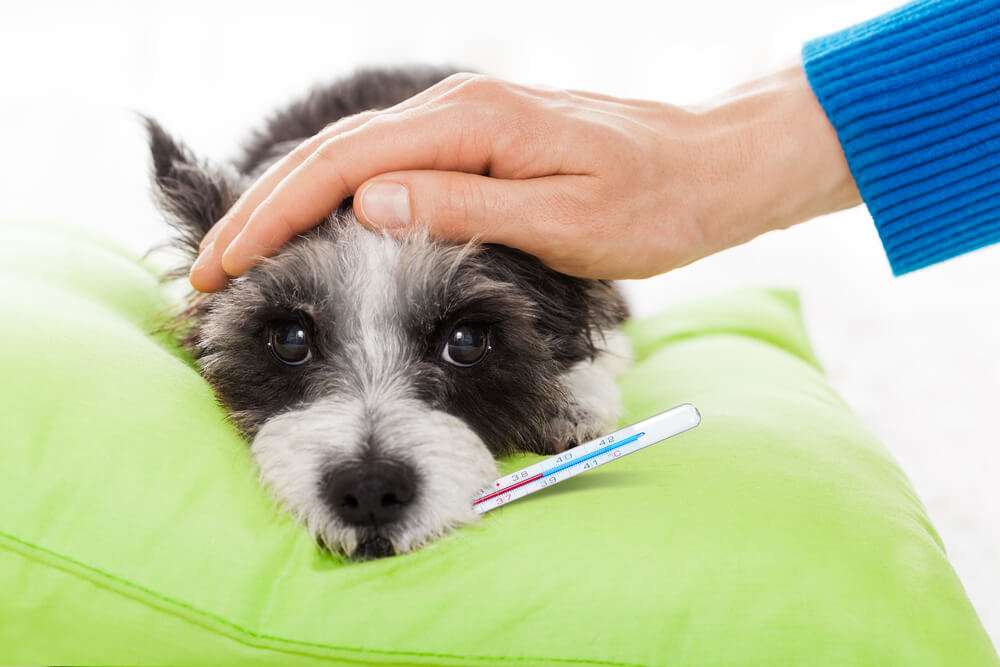
Table of Contents
Listen To The Article
Introduction to How To Spot A Sick Puppy?
In the life of every puppy, sickness can be a common occurrence.
Between the arrival of new pets, the flu season, and many other factors, there is no doubt that most puppies will suffer one sickness or another in the course of a year.
One of the hardest things to do is to tell if a puppy is sick.
Since puppies can get sicker faster than we can notice, a lot of people have trouble telling if their puppy is sick.
This is especially difficult for anyone without a lot of experience with dogs, or who doesn’t have an expert opinion to turn to.
A sick puppy can be hard to detect.
It’s important to spot a sick puppy’s symptoms before it’s too late.
The first sign of illness in a puppy is a change in behavior.
Puppies are typically playful and energetic, but an ailing puppy may be lethargic, unwilling to play, or not eat as much.
A puppy who has a respiratory infection, for example, may have a wet cough or congestion.
It can be difficult to tell if a puppy is sick.
If they’re lethargic or showing other signs of illness, it’s best to take them to the vet as soon as possible.
However, if your puppy is acting normally, there are a few things you can look out for.

Is My Puppy Sick?
There are many dog illnesses that puppies are at risk of contracting and a variety of symptoms that could mean trouble is brewing.
To make matters even more confusing, certain symptoms can be signs of either a dangerous disease or a much simpler, less worrying one.
In addition to obvious physical issues such as diarrhea, vomiting, lameness, and so on, behavioral changes are often early warning signs of illness.
It doesn’t take long for you to become familiar with your puppy’s individual pattern of behaviors such as:
- How long he can play without getting tired
- How much he eats in a day
- How often he needs to ‘potty’ and what’s normal for his bowel movements
- Whether he’s normally happy, excitable, or mellow
- Pay close attention to any sudden changes in these areas as they are often one of the very first indications that your puppy is unwell.

Common Signs Of Illness
Dogs don’t have the ability to tell us how they feel.
However, anyone who has ever had a dog knows that canine body language is very expressive.
Dogs will instinctively not show us that there is something wrong in the early stages of an illness because you know your dog, you may be able to pick up on some subtle changes in his personality and actions.
These subtle changes usually indicate that something is wrong.
The key to helping your dog recover quickly is noticing that there is a problem as soon as possible.
Lethargy
While puppies do need a significant amount of sleep, doing nothing but sleeping is a concern.
After the first few weeks, if a puppy isn’t engaging in play with littermates or curious about exploring the world, they may not be feeling their best.
A puppy who just lounges around and lacks enthusiasm should be examined further to ensure they aren’t starting to show symptoms of being sick.
Coat & Skin
Check puppies daily by running your hands over their bodies to confirm there are no ticks, fleas, insects, or wounds.
Puppies can be clumsy and are still learning how to play safely with others.
Accidents such as scratches and scrapes can occur that may need attention.
If a puppy’s coat loses its luster or becomes patchy, a visit to the veterinarian is in order.
Appetite
Puppies eat a lot! Big life changes, such as a puppy moving to his new home, may cause a temporary lapse in appetite, but once he’s settled, he should be happy to chow down.
While the amount and type of food that a puppy should eat changes based on age, if a puppy isn’t eating as much as usual or is having trouble keeping food down (vomiting), it’s time to visit your veterinarian.
Ears
If a puppy is scratching or rubbing his ears, shaking his head, or you notice a foul odor coming from his ears, he may have an ear infection.
While adult dogs generally experience ear infections due to bacteria and yeast growth, ear infections in puppies are more typically due to mites.
If you suspect an ear infection in a puppy, visit your vet who will do an examination, clean out the ears, and recommend a medicated ear cleaning solution for your use at home.
Eyes
A puppy’s eyes should be clear and free of goop.
There are several eye conditions that can cause issues, such as pink eye and dry eye.
If a puppy is squinting, excessively blinking, pawing at his eyes, or has a discharge, you should visit the vet right away.
Diarrhea
Since puppies are known for eating things they shouldn’t, puppy diarrhea is, unfortunately, a common symptom of varying issues.
Reasons a puppy may have diarrhea include diet change, bacterial infection, viral infection, ingestion of foreign bodies, parasites, or stress.
A puppy with diarrhea should be observed, and the veterinary should be called.
You can explain any additional symptoms to the vet, and he can tell you if the puppy should be brought in for a visit.
Weight
Many breeders track the weight of puppies at a minimum through the first two weeks of life.
Ensure that puppies are steadily gaining weight and receiving proper nourishment.
This is the best way to help them become strong enough to fight off illness.
Once a puppy heads home, new owners can track weight by teaching their puppy to sit or stand on a scale or by understanding body condition scoring.
Losing weight and reduced interest in eating is another concern. In this case, the puppy may be sick and should be taken to the vet right away.
Behavior
As the caretaker of a litter or an individual puppy, you should know the routines of your dogs.
Be aware when behavior deviates from normal.
A puppy who usually is bright and active when handled might suddenly become quiet and nonreactive if they’re feeling sick.
If a puppy suddenly becomes more vocal, with increased whining or whimpering, he may be trying to let you know that something is wrong.
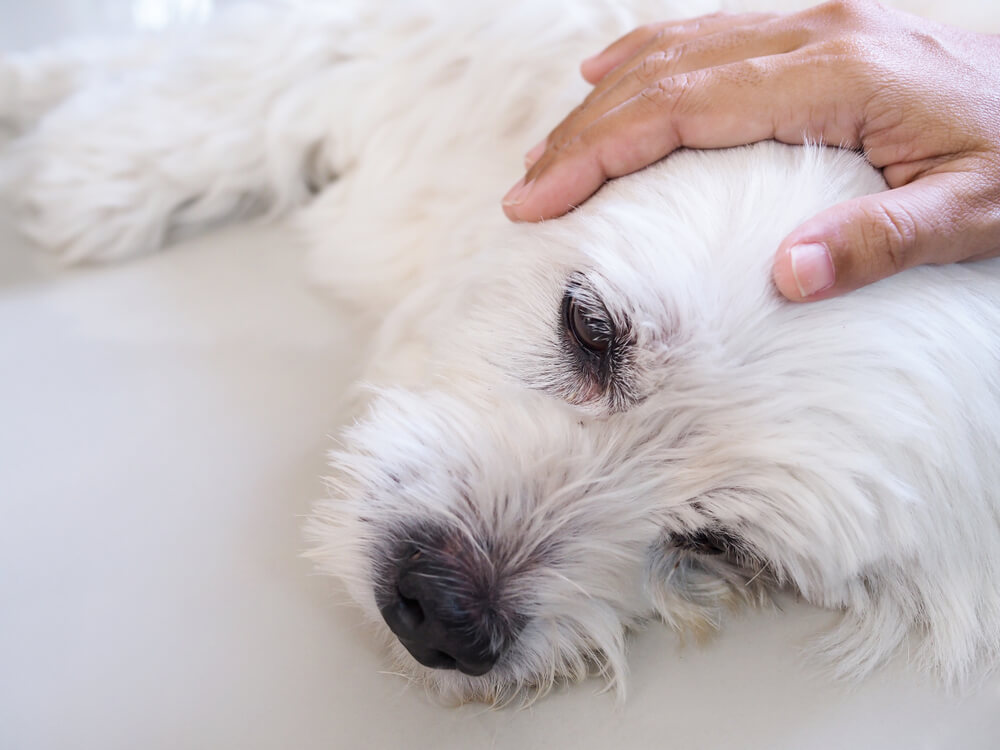
Symptoms Of A Sick Puppy
Change in activity level.
Particularly if your normally active, playful puppy seems exhausted, listless, and disinterested in his toys.
Change in appetite.
If your puppy suddenly seems to lose his appetite and won’t eat, or drink, this is a red flag. If he’s vomiting too, it’s even more critical that you talk to your vet immediately.
Change in bowel movements.
A big indicator of your puppy’s health is his stools.
If you suddenly find that puppy has diarrhea (with or without vomiting), it could signal the beginning of one of several illnesses and your pup is quite likely to get very sick, very fast.
Repeated, watery, or bloody diarrhea is an emergency situation and if your regular veterinarian’s office isn’t open, you need to get your puppy to a 24-hour pet clinic immediately.
It could be Canine Parvovirus or another serious, potentially deadly, puppy illness such as Coccidia or Giardia.
Soft stools or a single bout of mild diarrhea could just mean that your puppy raided the garbage.
Panting, shaking, or whining.
A puppy can’t tell you if he’s not feeling well, or what hurts but his behavior can give you clues.
Panting, shaking/shivering, unusually ‘clingy’ behavior or constant whining can all mean there’s something wrong and he’s trying to tell you about it.
Weakness, dizziness, or disorientation.
There can be a number of different reasons for these symptoms of puppy illness, and if your little guy shows any of them, you need to have him evaluated by your veterinarian quickly.
In small and tiny breeds, a drop in blood sugar can cause hypoglycemia which can result in all three symptoms.
Giving your pup a little Karo syrup can help alleviate symptoms of hypoglycemia, but if it happens more than once you need some expert advice.
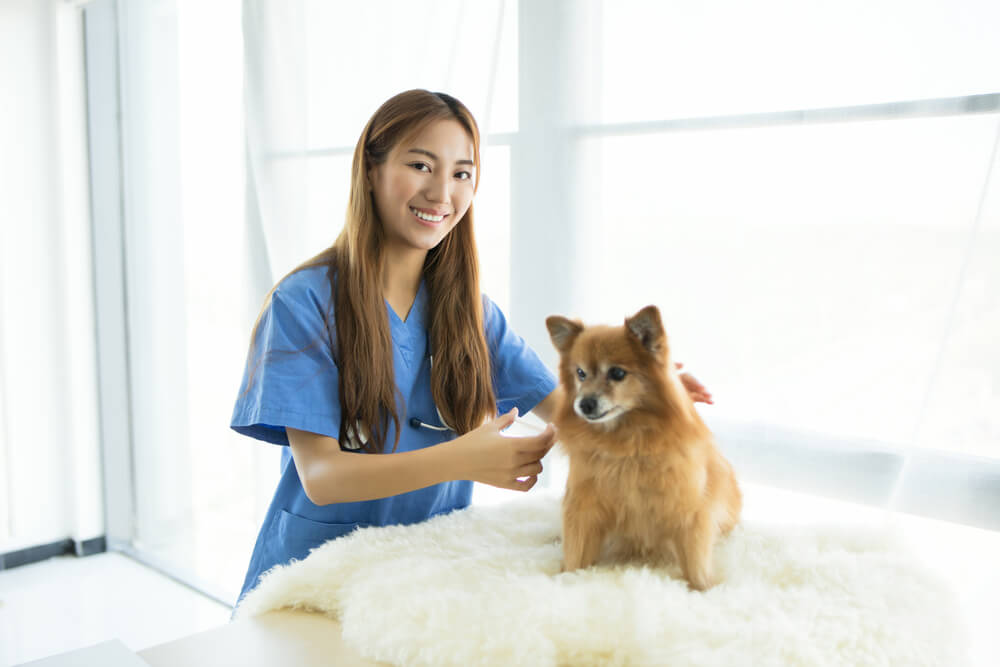
Helping A Sick Puppy
Caring for a puppy, especially when they’re sick, is a great way to build a bond between you and your pup.
Here are all the ways you can help your sick puppy begin to feel at home:
Encourage to lie down
If your puppy is sick, they will most likely be eager to rest.
To help, make up a comfortable bed for them to sleep on. Try to encourage them to lie down with toys and praise.
Speak in a calm and soothing voice
Puppies pick up on your mood and energy, so be encouraging and let them know everything is okay with a calm and soothing voice.
Give water
Take steps to ensure your puppy is drinking enough water.
Staying hydrated is vital for a sick puppy.
Drinking too much water can be dangerous too, so monitor how much water they are taking in.
Feed a bland diet
If your puppy is able to eat, feeding them a bland diet such as chicken and brown rice will help them digest easier and eat more.
Speak to a vet
If signs of sickness last longer than a day or seem too serious, always be sure to check with your vet so things don’t get worse.
Travel safely
Keeping your puppy calm and relaxed while traveling to the vet is very important.
Offer them treats and toys, while also speaking to them in a soothing manner during the trip so you don’t agitate your sick pup any further.
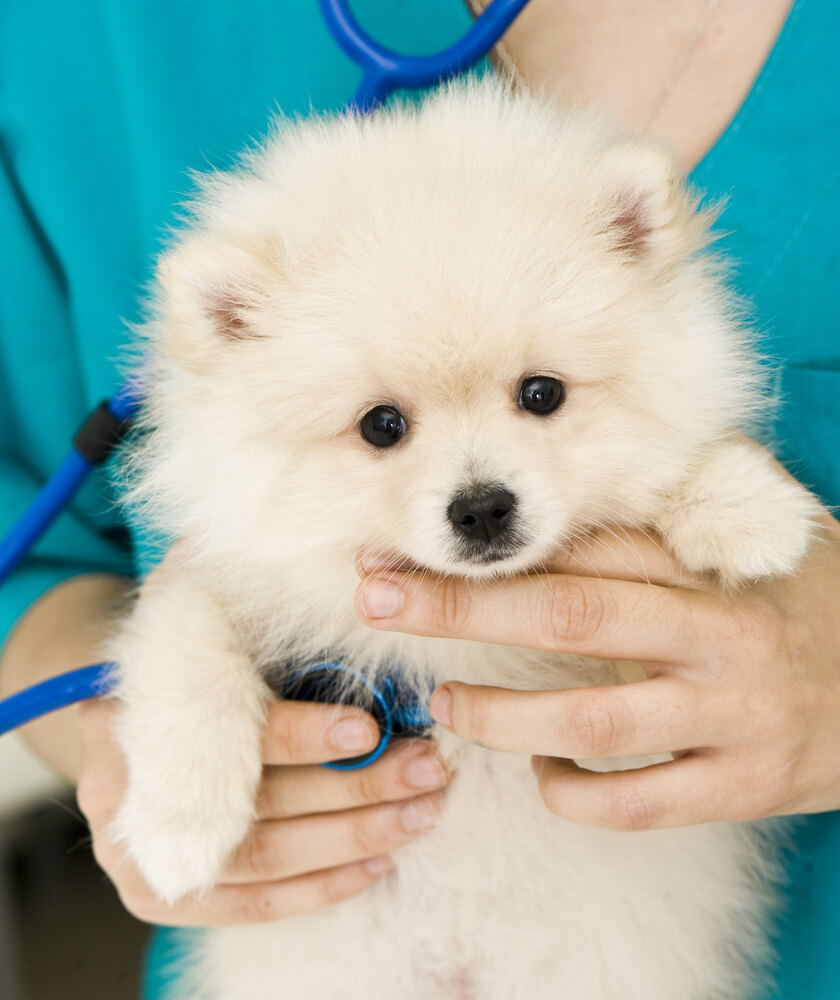
Diagnosis/Treatment
Because signs of disease are not always obvious, your veterinarian may recommend preventive care testing as part of your dog’s annual exam.
Preventive care testing often includes the following:
- Chemistry and electrolyte tests to evaluate internal organ status and ensure your dog isn’t dehydrated or suffering from an electrolyte imbalance.
- Tests to identify if your pet may have heartworm, tick-borne, or other infectious diseases.
- A complete blood count to rule out blood-related conditions.
- Urine tests to screen for urinary tract infection and other diseases and to evaluate the ability of the kidneys to concentrate urine.
- A thyroid test to determine if the thyroid gland is producing too little thyroid hormone
An ECG to screen for an abnormal heart rhythm, which may indicate underlying heart disease. - Additional tests may be added on an individual basis. Your veterinarian will recommend the right course for your best friend.
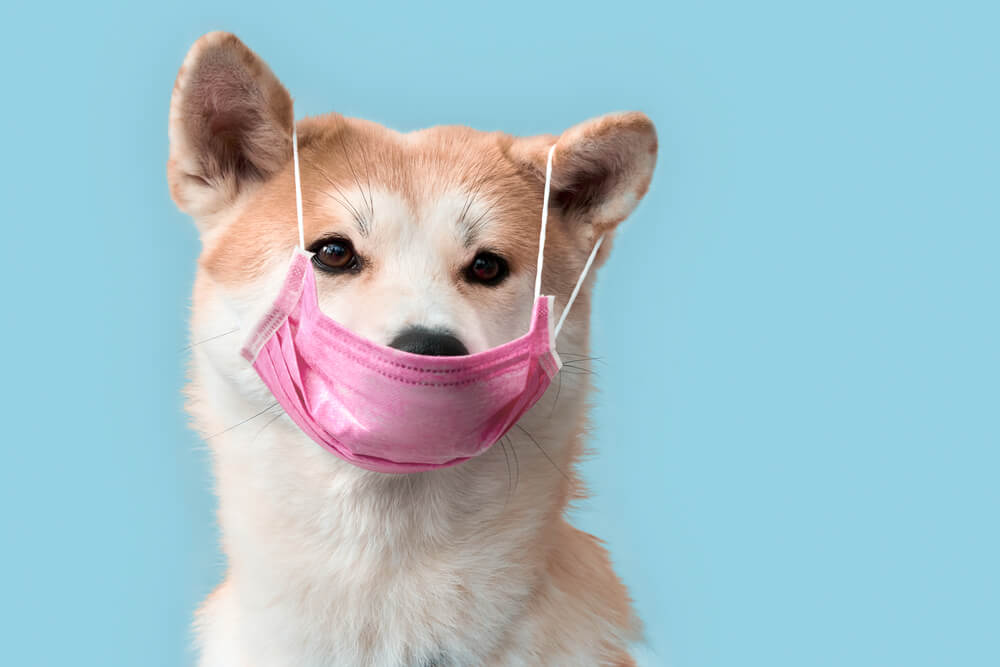
How To Prevent Sickness
Preventive care screening not only helps to detect disease in its earlier stages when it is most likely to respond to treatment, but it also can help you avoid significant medical expense and risk to your dog’s health if an illness goes undetected.
In addition, by establishing your pet’s normal baseline laboratory values during health, your veterinarian and you can more easily see when something is wrong with your pet.
Annual screening is the best preventive medicine.
Diet
Providing a healthy and nutritious diet is crucial to raising a healthy puppy.
Puppies are constantly growing so a full diet is important to keep this growth healthy.
We suggest feeding your puppy a protein-heavy meal so you know your dog is getting their proper nutrition.
Coat, teeth, and eyes
Pay attention to your puppy’s coat, skin, and eyes.
It’s vital to keep these three areas healthy to ensure your pup’s overall well-being.
Weight
Check with your vet what your puppy’s ideal weight should be.
Managing your puppy’s weight is a great way to establish great health.
Exercise
Exercise is imperative for all dogs, but even more so for puppies.
Puppies have a lot of energy they need to get out so it’s important that you walk and play with them as much as they can.
Don’t overdo it though; they are still puppies and aren’t as tough as adult dogs.
Having a puppy is a very rewarding experience.
The extra amount of work and attention pays off in great ways.
Getting sick is inevitable for puppies but hopefully, this helps you to better understand how to care for them when they’re under the weather.



